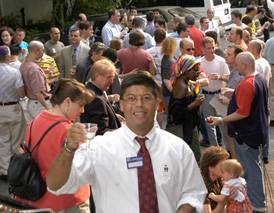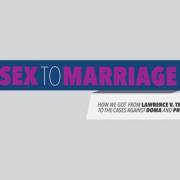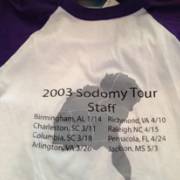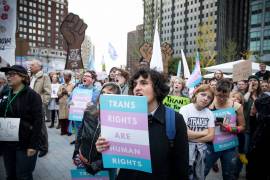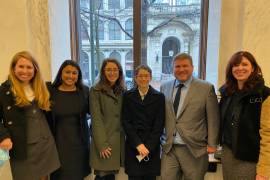
From Sex to Marriage: Our 5-Month Sodomy Law Tour
Blog Search
In the blog series From Sex to Marriage: How We Got From Lawrence v. Texas to the Cases Against DOMA and Prop 8, we ask key players in Lambda Legal’s biggest victory to discuss the importance of the landmark case, and its impact on the marriage cases currently before the Supreme Court.
In this installment, Hector Vargas, former Regional Director at Lambda Legal’s Atlanta office, discusses our community education strategy in the South regarding sodomy laws. Vargas is the Executive Director of GLMA: Health Professionals Advancing LGBT Equality.
When I joined Lambda Legal’s Southern Regional Office in 2001, I knew that I’d be put in some challenging and potentially awkward situations. But few were as challenging—and more fun—than traveling across the South talking about sodomy.
Yes, I got paid to preach the good word about gay (and straight) sex in the very states where anti-sodomy laws were still on the books. And when the groundbreaking Lawrence ruling came down, we celebrated that day in Atlanta with—what else?—a “Lick for Liberty” ice cream social.
Lambda Legal’s Sodomy Tour—a trek across six states and eight cities—began in January 2003 in Birmingham, Ala. Just one year prior, in an infamous concurring opinion denying child custody to a lesbian parent, the chief justice of the Alabama Supreme Court, wrote:
The State carries the power of the sword, that is, the power to prohibit conduct with physical penalties, such as confinement and even execution. It must use that power to prevent the subversion of children toward this lifestyle, to not encourage a criminal lifestyle.
It’s easy to forget the climate that existed in 2003, certainly in the 13 states (mostly in the South) where sodomy laws were still in effect, but also across the country. Although prosecutions under the statute may have been rare, the sodomy laws, as in the Alabama custody case, were used to brand LGBT people as criminals and second-class citizens.
So it was important to develop a public education campaign that would prepare the LGBT community and the country as a whole for an eventual Supreme Court ruling in Lawrence. No matter the decision, we wanted to ensure that the community was ready to redouble efforts to challenge sodomy laws and other forms of discrimination should we lose—or to use the momentum of victory to focus on nondiscrimination ordinances and statutes and other equality measures.And we certainly wanted to tell the stories, particularly to the general public, of how sodomy laws weren’t a relic of history. Judges, policymakers and the public deemed us as criminals—unworthy of inclusion in nondiscrimination statutes; disqualified to hold law enforcement, teaching and other governmental positions; and not sufficiently moral to parent our own children.
Thus, the “You Make Love, We Make It Legal” town hall series was born. Over a five-month period, my colleagues and I visited Birmingham; Columbia and Charleston, S.C.; Arlington and Richmond, Va.; Raleigh, N.C.; Pensacola, Fla.; and Jackson, Miss. In one of several ironic moments throughout the series, we spoke openly about sodomy (laws) and LGBT equality in the Strom Thurmond Auditorium of the University of South Carolina School of Law.
During these town hall meetings, we engaged hundreds of LGBT people and allies to galvanize and organize in preparation for a decision in Lawrence. I’m almost certain that the Supreme Court did not have the 2003 Pride calendar in mind when it finally issued the Lawrence decision on June 23, 2003, but it was a perfect gift to get this ruling just days before Atlanta and other major cities across the country would be celebrating Pride.
Of course, the Georgia sodomy law was the subject of the infamous Bowers v. Hardwick case, in which just 17 years earlier, the Supreme Court had upheld sodomy statutes. (The Georgia Supreme Court invalidated the law in the interim.) For that reason, the decision was particularly meaningful in Atlanta, as a crowd gathered in the heart of the LGBT neighborhood on decision day. Our plans for “Lick for Liberty” were that, ice cream cones in hand, we would engage an act of civil disobedience or a long-awaited celebration.
At that moment, we knew that the public education campaign had been successful. The goals for the series included building empowerment and hope among LGBT people, obviously so we could experience this tremendous victory. But more important, so that we could see a day like we have today, where there has been so much progress in such a short amount of time on issues of LGBT equality, thanks to the hard work of people all across the country who believed that their actions could make a difference.
We clearly have so much more progress to make, but the legal underpinnings of Lawrence and the educational work around it have opened the door to opportunities for achieving meaningful equality for the LGBT community.
“You Make Love, We Make It Legal.” I can’t think of a more fitting way to describe our progress.
Next: Former Lambda Legal board member Paul M. Smith shares his experience arguing Lawrence before the Supreme Court.
Previously:
- Lambda Legal Executive Director Kevin M. Cathcart introduces the series and the guest bloggers.
- Attorney Mitchell Katine recalls receiving the phone call that set the Lawrence case in motion.
- Ruth Harlow, former Legal Director for Lambda Legal, discusses our legal strategy on Lawrence.
- Roger Poindexter, Regional Director at Lambda Legal’s Dallas office, reflects on what it was like living in Texas before and after the historic decision.

